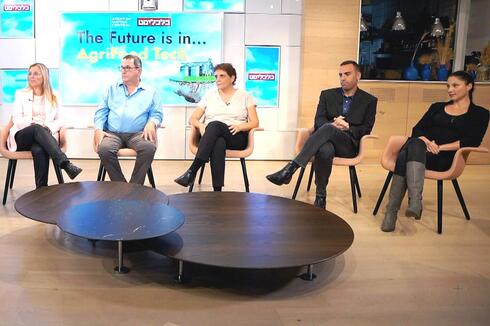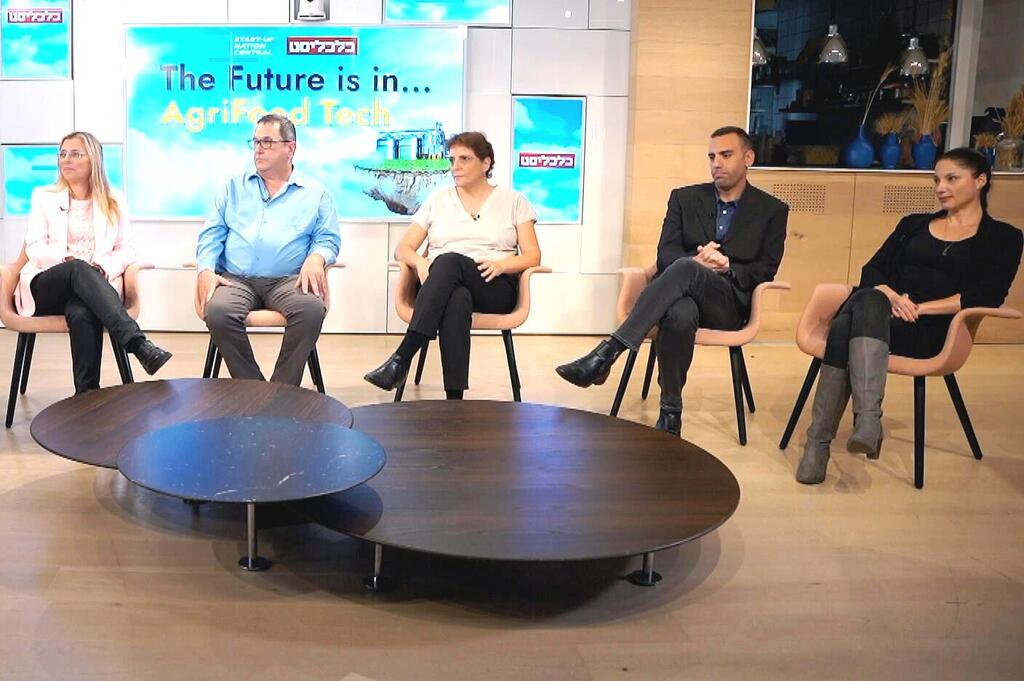
"We see one value chain between agtech and foodtech"
Speaking at "The Future is in AgriFood Tech” panel as part of a series of gatherings sponsored by Calcalist and Start-Up Nation Central, Eliran Elimelech, VP of Ecosystem Development at Start-Up Nation Central, noted how the agrifood sector in Israel needs strengthening
The Futute is in AgriFood Tech panel
(סיני דוד וטל אזולאי)
"We see one value chain between agtech and foodtech. Today, in Israel, there are over 500 companies across the strong foodtech sector. But there are fed by a not as robust agriculture sector, and that needs strengthening," said Eliran Elimelech, VP of Ecosystem Development at Start-Up Nation Central.
Elimelech was talking at "The Future is in AgriFood Tech" panel as part of the series of meetings sponsored by Calcalist and Start-Up Nation Central that aims to focus on some of the sectors that have not yet realized their potential.
"We, as an organization, try to look at the whole spectrum and try to help companies at different stages of growth," added Elimelech. "From 2017 to today, foodtech companies raised approximately $1.5 billion. The leading sub-sectors in this segment are sectors such as alternative proteins and novel ingredients, while less than a billion dollars were invested in companies in the field of agriculture. In agriculture there is complete segmentation of technologies in the field of irrigation, plant care technologies, pest control, etc. We recently published two maps that catalog these sectors and are continuing this work as part of our ongoing activity to map this sector which is significant for Israel."
Yoni Glickman, managing director at the PeakBridge venture capital fund, spoke about the climate summit held at the beginning of the month in Sharem El-Sheikh to emphasize the importance of this sector as a possible solution to environmental problems: "This was the first time agrifood-tech was mentioned, so it's already a win. Secondly, everyone understands that today the world of agrifood can solve about a third of greenhouse gasses, and unless we invest and advance in technology, we will not be able to deal with the rest. We are 30 years post the great inventions in alternative energy: 30 years ago there were investments in wind, solar energy, etc. However, in the world of foodtech, we are only just beginning. Thirdly, everyone understands that climate change also creates food insecurity for entire populations around the world, and we also need to take this into account and find solutions in agrifood-tech for this problem: to feed the world that is undergoing very, very significant climate changes."
"It's not just 30% of greenhouse gasses, it's 70% of freshwater, it's 38% of soil, it's farmers who face difficulties because of the transition from droughts to floods," added Dganit Vered, CEO of Smart Agro. "In Italy they lost 30% of this year's harvest due to the transition from severe drought to hail. The lack of food, and countries' ability to feed their residents in the coming years makes the situation very tough, and this needs to be managed on a global level and not just on a state level as it is today."
She also commented on the new challenges following the increase in interest rates and the new financial climate and stated that "it makes investments very difficult. There are two elements that are challenging to deal with today: One is early stage: do entrepreneurs even enter sectors that are not 'cyber' or 'gaming'". It's 'food', it's 'ag': you are dependent on seasons, you have to talk to traditional companies. The second part is scaling (growth stage): We invest in companies that scale and we are seeing that there are fewer new companies in the pipeline to invest in at this stage."
Taly Nechushtan, CEO of InnovoPro, was optimistic. "I remember that in the early days of foodtech in 2017, there were investors who didn't know how to define themselves exactly. What kind of investors are they? They heard about something called 'foodtech', and didn't quite know if it was of interest to them or not. Those who decided to specialize in foodtech such as PeakBridge, are here to stay. These are investors who know how to evaluate companies in a professional manner, and these are also investors who are interested in the topic of climate change and are interested in their LPs, their investors. There have always been geopolitical events and there always will be. But in the end, the agtech and foodtech companies are doing something today that is in line with the world's ambition and it will stay with us forever. Therefore, little by little even investors who didn’t 'understand', now do. Institutions and family offices have people who understand in the right positions so that they can evaluate whether an investment is right or not. And those who decide it's not for them, because they would rather make 5x in X years and get out - probably won't be investing in foodtech."
Glickman was also upbeat about the future of the sector, stating: "I actually think that the world of investors understands how important this field is. After Covid, a large part of the world understood its consequences, including obesity and everything related to the issue of health and also how the issue of agriculture (animal care) affects epidemics in the end. In addition, there will be the Russia-Ukraine war and the global shortage of wheat in its wake. Many investors realize that this is an area that is super important for the future and are entering it. Today we see more rich families, who see it as part of their desire to influence the future of the world, especially for their children. We are seeing increasing investments by institutional investors - especially in Europe."
Elimelech referred to the issue of financing - especially in early stage startups - which seems critical now and emphasized that alongside the need to encourage entrepreneurs and investors there is a very significant phenomenon that needs monitoring. "There are no significant exits to offer entrepreneurs. When you look ahead to see where the long-awaited exit will come from, there is a very interesting section that has emerged in recent years, where suddenly giant global players, such as Microsoft, AWS, large technological entities and top technology players, are entering this game. This is some kind of trend that we are checking and we are trying to see how we can encourage new entrepreneurs to enter. So this equation of bringing in more entrepreneurs, more companies, more players, should by and large create some kind of market or new ecosystem of investments and investors. We expose over 100 investors every year to new opportunities in Israel, and we are also, of course, active in this sector."
Noga Sela Shalev, CEO of the Fresh Start foodtech incubator, summed up the session and noted that "there are supporting infrastructures at the state level as well. By the way, our incubator is supported by the Israel Innovation Authority, for example, including countless types of grants."
According to Sela Shalev: "It is true that the cycles are very, very long. And therefore, a completely different attitude is required, but those who enter this field end up specializing in it and understand the cyclical issues. This field is so diverse in its content and the type of technologies that can enter it, so there is a lot of room for many types of ventures."
Sela Shalev referred to the things that need to be done in order to promote this industry further. "There is also awareness of the things we talked about such as this connection between foodtech and agrotech, the climatic effects, that there is no choice and we must promote these industries, so also the awareness of this aspect. At least here in Israel we are seeing that the media is very, very supportive of this matter."
















